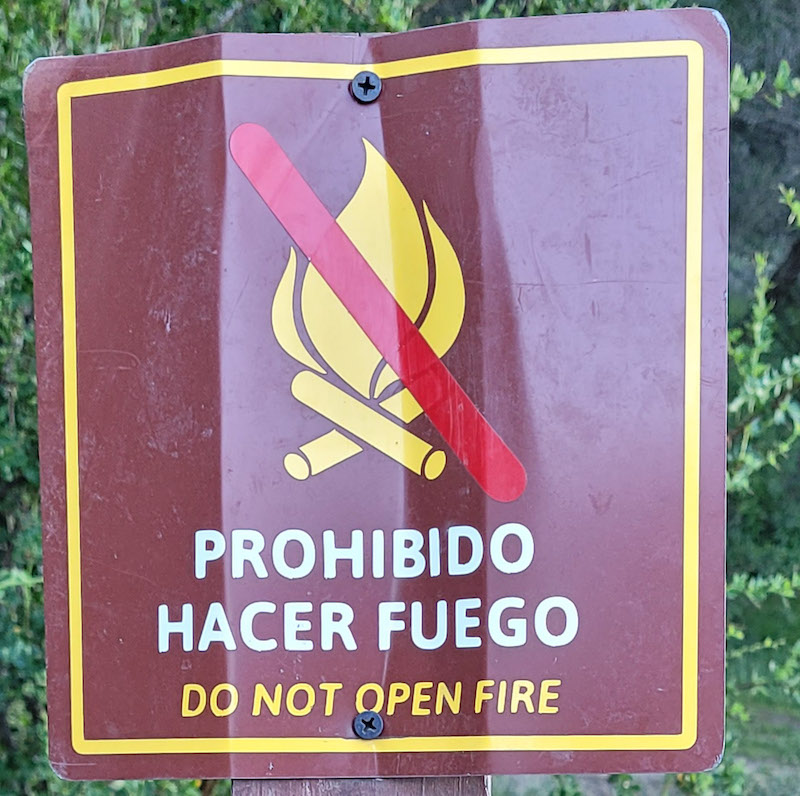Open fire
« previous post | next post »
Tim Frost found this sign last (southern hemisphere) summer at a lakeside in Argentina, near San Martin de los Andes.
I think "open" causes problems with translation from other languages as well, e.g.: Mandarin dǎkāi shōuyīnjī 打開收音機 sometimes gets translated as "open the radio".
Selected readings
- "Firefighting without the fire" (12/12/15)
- "Word lens" (12/17/10)
- "Ask Language Log: 'He who plays with fire will get burned'" (8/5/22)
- "Mandarin neologism: 'appointment to fire a cannon'" (1/10/18)
- "Google me with a fire spoon" (7/28/11)

Paul Clapham said,
September 2, 2022 @ 10:48 pm
I'm a bit surprised by that. I was under the impression that Spanish (and French) speakers at some point in learning English had to have the "Make versus Do" lesson for translating "hacer" (and "faire"). So I would have expected "Do Not Do Fire" as the likely error.
But perhaps this is an automated translation? Google Translate gets it right so I don't see where "Open" comes from.
F said,
September 3, 2022 @ 12:10 am
"Open fire" is an idiomatic expression, just not a relevant one. So although I can't reconstruct the thought process I think this must be an error of overthinking.
unekdoud said,
September 3, 2022 @ 12:41 am
It could be one of those mental-autocorrect situations where the translator forgot the verb "set" and just filled in the next verb phrase they could recall. Or perhaps they decided to specify "open flame" for the English text, but messed up the grammar.
When you turn on a tap (say to make your 白开水) you're physically opening the tap. But when you turn on the lights you're closing a circuit. Physically: closing a gap clears a path for electricity.
Peter Taylor said,
September 3, 2022 @ 4:37 am
"Open fire" in the sense of "discharge a weapon" translates word-for-word into Spanish ("abrir fuego"), which should have raised a suspicion that it wasn't necessarily right.
unekdoud might be onto something: there are plenty of occurrences of "Open fire(s) prohibited/banned/forbidden" in English-language signage, so maybe someone took one of those and reworded it to fit on one line.
Cervantes said,
September 3, 2022 @ 6:51 am
Yes, I don't think this results from an attempt to translate the Spanish, which means literally and unambiguously "Do not make fire." I think its an attempt at what the writer incorrectly thinks is idiomatic English. Either they're thinking of the concept of a "open fire," i.e. a Coleman stove is okay; or they think "open fire" in English means to start combustion.
Christian Weisgerber said,
September 3, 2022 @ 8:10 am
Building on the previous comments, I offer this hypothesis:
The intended phrasing would have been
with open fire understood as an idiomatic phrase. They tripped over the do/make distinction and picked do, which would have given
I think they then failed to understand that do as a lexical verb requires do-support, and so arrived at
chris said,
September 6, 2022 @ 3:04 pm
I think confusion between the two different English expressions "open fire" (one with open as an adjective, the other with it as a transitive verb) is likely.
"Do not make an open fire" is one correct way to express in English what was wanted, but if you know that "make" and "open" are both verbs in English then maybe that sounds like it can't be right?
Chas Belov said,
September 10, 2022 @ 12:57 am
My eastern European grandmother would use "close the light" to mean "turn off the light".
Mike said,
September 10, 2022 @ 7:10 pm
Turn on/off and open/close the light likely come from the days of gas lighting where a valve was turned to control the flow of gas